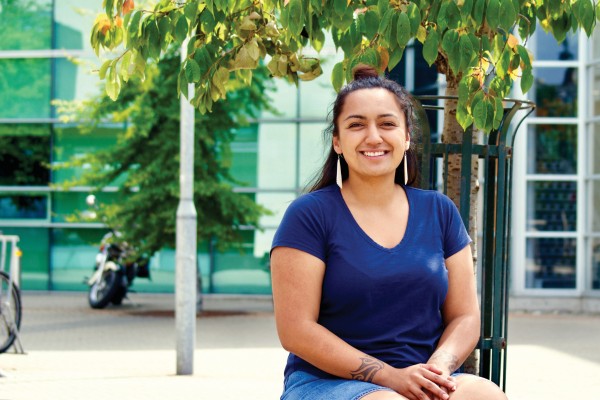While Taylor-Rose Terekia is working hard to become the next Taika Waititi studying Indigenous Development, Film and Media Studies, and Marketing, she is also Tumuaki (President) of Te Roopū Maori. Her role involves providing support and community for Māori students at Otago, “in a way that we don't lose or forget our Indigenous roots, protocols and values”. The group was initially founded to stop Māori voices being marginalised around Uni, and has now grown into an association with over 2000 members.
Alongside providing support for Māori students, Te Roopū Māori is working to fight issues around campus on a macro level. Taylor says, “we are conscious of racism. We see the need in our university for improvement in the area of cultural competency both within staff and in students. Our focus this year is to epitomise through our presence in our whare, in the many events that we organise and with all people that we interact with on campus, the tikanga Māori we live and breathe and that make us Māori, through the values of manaakitanga, kotahitanga, whanaungatanga.”
For Taylor, being the leader of Te Roopū Māori was not something she necessarily planned on. “Most of the time [the reason] I went for executive roles is because no one else did, including the role I am currently in. I remember the internal struggle hours before handing in my application for the role for elections last year. I really didn't want the job, because I understood the stress that came with it (you try balancing study and progressing decolonisation). But in the same breath I really wanted to take the lead and possibly implement some positive change within Te Roopū Māori and ultimately the University as a whole.” She told Critic that expressing knowledge of tikanga Māori and Te Reo among campus with confidence is vital to this role.
Although it has been a massive change of pace, the benefits really do pay off. For her, the main benefit is seeing how proud students are to represent their Māori heritage. “What keeps me in the job is my whānau, My executive and my friends/Te Roopū Māori whare locals this year have been my backbone. They are my brothers and sisters who will give me hugs when I wanna cry/fight someone, or take me to Starters in the afternoon to debrief.”
“My teina, the many Māori students I have met for the first time this year in this role and seeing them enjoy and be proud to rep Te Roopū Māori, and be Māori, inspires me. It was events like our performances [at] the University and City vigils that reaffirmed for me why I do what I do, and made me proud to be Māori and the Tumuaki of Te Roopū Māori.”
What is most important to Taylor about being a part of Te Roopū Māori is the people she gets to meet. “Te Roopū Māori is literally my second family, my home away from home. In a residential college and in my core business papers in first year; seeing another Māori face, or hearing your native tongue being spoken was rare. Te Roopū Māori was where I found my people, who understood tikanga Māori, a place where I could sing, haka, speak, connect in the ways that were normal for me, and it felt like home.” Alongside creating events for students such as sports competitions and the Māori Ball, Te Roopū Māori are working on creating systemic changes around Otago. For instance, they are working towards building a proper whare for meetings, calling out casual racism on campus, elevating the status of Te Reo Māori and hosting the National Māori Tertiary Students conference in late August.
Taylor will be graduating this August, when she plans to start her Master’s degree in Indigenous Studies. Aside from avoiding “getting roasted at the Te Roopū AGM” in a few weeks, she hopes to teach abroad in South Korea within the next few years, as well as keep learning and practising Te Reo Māori. But for now, you can keep an eye out for her upcoming Te Reo show on the Radio One airwaves very soon.
You can find Te Roopū Māori on Facebook, and on Instagram at @teroopumaori.






